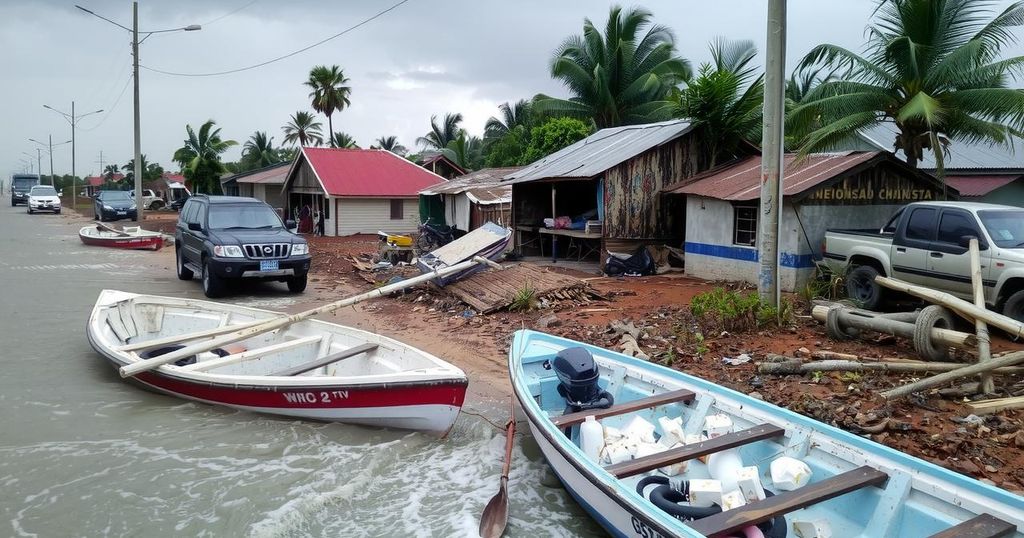Cyclone Chido has devastated northern Mozambique, displacing thousands and destroying homes, schools, and infrastructure. The UNHCR is providing emergency relief and coordinating humanitarian efforts in the region to support affected communities. There is concern over the impacts of future cyclones due to climate change, emphasizing the need for ongoing assistance.
Tropical Cyclone Chido has wreaked havoc in northern Mozambique, particularly affecting Cabo Delgado and Nampula provinces. The cyclone has resulted in the destruction of homes, displacement of thousands, and has severely impacted road and communication infrastructure, complicating relief efforts in areas already housing significant numbers of forcibly displaced individuals. The United Nations High Commissioner for Refugees (UNHCR) is actively addressing the urgent needs of these vulnerable populations in collaboration with the Mozambique government and humanitarian organizations.
In the aftermath of the cyclone, UNHCR provided emergency relief to over 2,600 people at Pemba’s main accommodation center, distributing essential items such as blankets, sleeping mats, mosquito nets, and emergency shelter supplies. The situation remains dire, with approximately 190,000 individuals requiring immediate humanitarian assistance, 33 schools affected, and nearly 10,000 homes destroyed across multiple villages. The cyclone has compounded pre-existing issues of conflict, forced displacement, and economic struggles that have left communities increasingly susceptible to disasters.
Prior to Cyclone Chido’s landfall, UNHCR and its partners strategically pre-positioned emergency relief items and disseminated disaster preparedness messages through various media platforms. This proactive approach aided local disaster management committees in prioritizing aid for the most vulnerable. Notably, at Maratane camp in Nampula, over 8,000 refugees experienced minimal damage, indicating that recent innovations in climate-resilient housing have proved beneficial.
The cyclone’s damage extended beyond Mozambique; Mayotte, part of France, also sustained significant destruction, with casualties and infrastructure damage reported. UNHCR continues to monitor the situation and coordinate efforts with local partners, while in southern Malawi, Cyclone Chido brought destruction to houses and infrastructure across various regions. UNHCR has pre-positioned shelter kits to bolster government-led responses.
UNHCR expresses concern that Cyclone Chido may herald an intense rainy season, traditionally associated with cyclones and severe flooding in the region. Displaced communities, marginalized by existing hardships, are at heightened risk of further displacement and loss, underscoring the effects of climate change on vulnerable populations. UNHCR remains steadfast in its commitment to assist affected communities in Mozambique and the wider region, collaborating closely with governmental bodies and humanitarian entities. However, growing constraints on resources significantly challenge ongoing relief efforts, necessitating urgent assistance for thousands in the coming days.
Tropical cyclones are powerful storms that pose significant threats to vulnerable regions, particularly in Southern Africa, where communities often lack adequate resources to recover from natural disasters. Cyclone Chido has severely impacted northern Mozambique, a region that has already been grappling with issues such as armed conflict, economic hardship, and large-scale displacements. Humanitarian organizations, including UNHCR, play a critical role in providing essential relief and protecting the rights of affected populations amidst escalating climatic challenges.
In summary, Cyclone Chido has resulted in devastating consequences for communities in Northern Mozambique, causing extensive destruction and displacing thousands. The UNHCR, in coordination with local and international partners, is actively working to provide immediate aid and support to the affected populations while addressing the broader implications of recurrent climate-related disasters. There is a pressing need for continued support and resource allocation to safeguard the futures of these vulnerable individuals.
Original Source: www.unhcr.org







